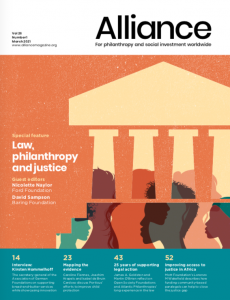1,587 climate litigation cases were brought between 1986 and 2020 according to LSE’s Grantham Institute and the recent UNEP Global Climate Litigation Report: 2020 Status Review found that climate cases have nearly doubled over the last three years. So, it’s a thing.
Climate change poses the single biggest threat to the future of today’s children. The Children’s Investment Fund Foundation (CIFF) is committed to accelerating systemic solutions that will mitigate climate change. We invest into a wide range of strategies on important issues such as energy transition, air quality and land use, whilst prioritizing cross cutting approaches including international climate diplomacy, finance engagement and communications to help create the pressure and demand for positive climate action.
Litigation has become an increasingly important tool as we seek to inform, implement and enforce laws and influence policies. Ultimately, we’re working with partners to bring climate cases to the courtroom with the goal of creating change for the benefit of society.
We need to learn from other cases, some of which have reached iconic status. The best example perhaps is Urgenda, in which the Dutch Supreme Court ordered the Dutch government to reduce its emissions immediately in line with its human rights obligations.
Urgenda has inspired many others across the globe, including young people in Colombia who sought to enforce fundamental rights to a healthy environment. Recently a coalition of French NGOs won a similar victory in ‘L’Affaire du Siecle’, a case that managed to attract the support of 2.3 million citizens. Both governments have since been on the back foot, pressured by their own people to take climate change seriously and ‘embarrassed into action’ by their own courts.
It is not just governments that feel the heat of litigation. Companies like Shell and Total face court orders that could compel them to align their business strategies with the 2015 Paris Climate Agreement goals, the impact of which would be immense.
At least, this is what those of us working in the field of climate litigation feel. But do we really know for sure? These cases may well be iconic, but are they as impactful as we believe them to be? And if so, why?
For Urgenda-type cases, it is possible (albeit complex and costly) to assess the impact on policy. Similarly, if a coal-fired power plant is cancelled, such as Thabametsi in South Africa, one can measure the emission reduction. But every campaigner knows that litigation can also be a real mobiliser, irrespective of success in the courtroom.
For instance, Greenpeace Nordic and youth group Natur og Ungdom recently lost their constitutional case against Norway’s Arctic drilling practices at the Supreme Court, but in the process generated a big debate in oil-rich Norway about its schizophrenic attitude towards climate, accompanied by strong criticism from the UN. A recent opinion poll shows that the majority of Norwegians now support a ban on drilling for climate reasons. Interestingly, those that were more familiar with the case were more supportive of the ban.
To help build the climate litigation ecosystem we need to invest in cutting edge measurement systems that show the direct and indirect impact we can have. NGOs, activists, practitioners and their funders, lack an empirically grounded framework to assess the impact of their litigation efforts. CIFF and partners have worked hard on theories of change and assessment tools, but these can be resource intensive, and we know that there is more to learn, especially as some of the smartest experts on the planet haven’t yet figured out what works best. We want to develop a learning framework that can add value for everybody and ensure collaboration and learning across the litigation field.
With this in mind, CIFF, in conjunction with our core grantee the Foundation for International Law & Environment (FILE), are working with researchers at Oxford, LSE and Columbia University to develop multi-disciplinary impact measurement methodologies. We believe in funding work to set up robust measurement systems, commissioning strategic evidence reviews, sharing findings across the field and having litigation experts conduct real time evaluations that provide strategic course corrections. Everyone within philanthropy who has an interest in these developments is welcome to join us to help create a learning climate movement.
Jasper Teulings is the Director of Strategic Litigation (Climate) at CIFF, and can be reached at jteulings@ciff.org. Shishusri Pradhan is the Manager of Evidence, Measurement and Evaluation (Climate) at CIFF, and can be reached at spradhan@ciff.org.
New issue: Law, philanthropy and justice
 Legal action has a significant contribution to make to achieving social change and covers a huge range of fundable activities. These include widening access to justice, supporting public legal education, investing in the next generation of activist lawyers and helping human rights defenders and climate activists. Yet only a small part of organised philanthropy has a specific strategy for legal action and many funders are cautious about working in this area. This issue will explore new ways for funders to reimagine justice and debate effective strategies for contemporary philanthropic engagement in and with the law. Guest edited by Nicolette Naylor, Director of the Southern Africa office of the Ford Foundation and David Sampson, Deputy Director, Baring Foundation, UK.
Legal action has a significant contribution to make to achieving social change and covers a huge range of fundable activities. These include widening access to justice, supporting public legal education, investing in the next generation of activist lawyers and helping human rights defenders and climate activists. Yet only a small part of organised philanthropy has a specific strategy for legal action and many funders are cautious about working in this area. This issue will explore new ways for funders to reimagine justice and debate effective strategies for contemporary philanthropic engagement in and with the law. Guest edited by Nicolette Naylor, Director of the Southern Africa office of the Ford Foundation and David Sampson, Deputy Director, Baring Foundation, UK.
Subscribe today!







Comments (2)
The article is superb and insightful. It has helped me immersely in answering and writing my scholarly paper for contribution to a journal.
A very insightful piece and innovative, impactful approach to climate justice. I appreciate your sharing.